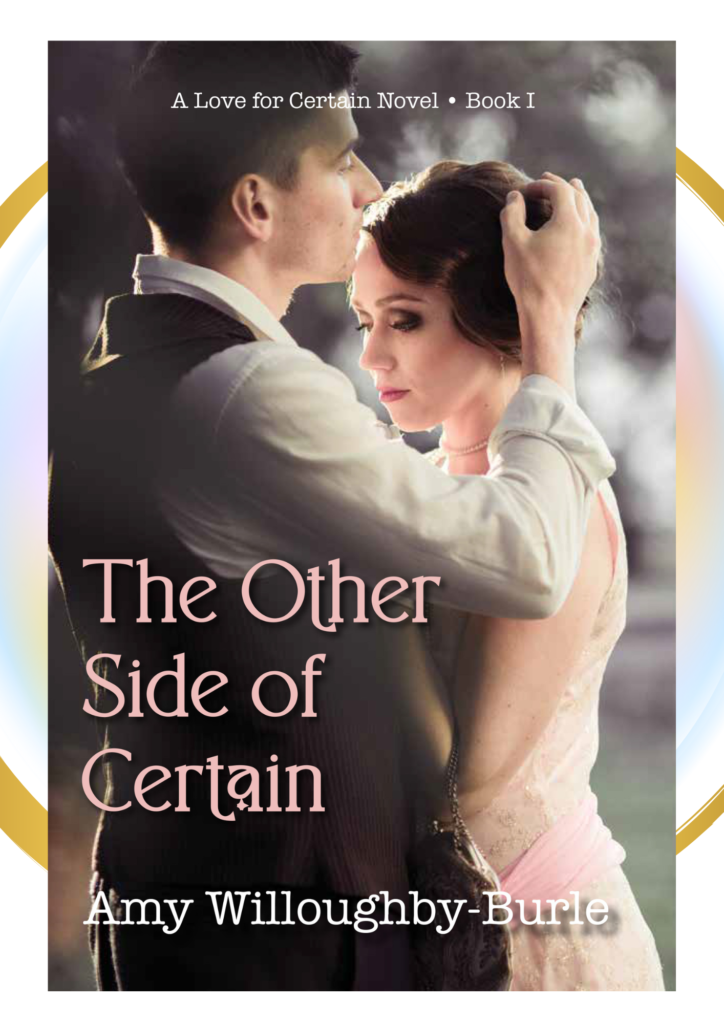
The Other Side of Certain

Chapter 1
Mattie
When I stepped out of my father’s 1936 Studebaker and onto the gravel in front of the Certain, Kentucky WPA library headquarters, I felt as much like Alice falling down the rabbit hole as I’d had any time in all my life. My father’s driver unceremoniously left me and my bags and boxes on the curb and drove away as if he might be trapped in this dismal Wonderland forever should he not make an immediate getaway. I was all but standing there in a cloud of dust as he drove off.
Waving the cloud of dirt and fumes again, I shielded my eyes against the mid-summer sun as it radiated off the old stone church building in front of me that housed the library. I could feel the heat sideling up beside me like an unwelcome but expected guest. Nevertheless, I was not to be daunted, and I straightened my shoulders and made ready to push open the large wooden doors of the make-shift library where I was to help two days a week while I got the small town of Certain, Kentucky’s school program reinstated.
This was not the path I had planned for my life, but my life never had gone according to plan. I was not one to be shaken by things going awry, and this new “turn of events” the country found itself the victim of was certainly not going to be the first thing to stop me, no matter how devastating. When things had gotten tough, Eleanor Roosevelt had put on her best walking shoes and hit the pavement and that’s what I was going to do, too.
Upon entering the old church, the smell of books found my nose immediately, and I breathed in deeply. My eyes closed for a moment, and I imagined all the stories around me coming to life. I didn’t yet know which books were there, but I could sense their characters in the corners of my imagination and hear them whispering to each other, one story to the next as if they were all connected somehow.
Ok, so I’ve been accused of being a little fanciful and flighty. Is that really the worst thing?
The heavy door closed behind me and my eyes fluttered open. All around me was color and light. The shifting summer sun found each panel of the stained-glass windows along both walls of the small church and cast a swirl of color around the room. It reminded me of the kaleidoscope my mother had given to me when I was six. My hands would find it whenever escape was needed, especially during the years when she was no longer there. The sliding together and edging a part of color and shape mesmerized me. The seemingly endless combination of patterns pulled at my mind, creating a diversion from the world around me. The silent beauty entranced me, and I thought, then, that there was some way I could slip inside the pools of color and join their ebb and flow. I could almost feel the cool of the blues and greens like the waters of a lake and the warmth of the golds and yellows like the sun on my skin after a summer swim. At night, I could close my eyes and envision the swirl of light and magic and drift off to sleep with the idea that the world was a beautiful place. It had been, once.
“Mattie?”
The sound of someone saying my name startled me. I turned to see a woman who appeared to be around my age, late twenties or maybe just beyond, standing at a large wooden desk like the ones teachers used in the classrooms in which I had hoped to work when I graduated from college a couple of years ago. My eyes let go of the colors streaming through the windows and looked around the inside of the church. One side of the building had been emptied of pews, and in their place, a couple of tables and a desk filled the space where the seats had likely been. Pews remained on the other side of the church, and it seemed they were used as bookshelves. Strange, but practical. I had read about the ingenuity of the poorer regions; how they made use of everything in the most imaginative ways. I had also been warned that they didn’t take kindly to strangers, and that I should work to fit in as best I could. That would prove to be hard for me as fitting in was not my greatest ability.
“Yes,” I answered the woman, stepping in her direction. “Mattie Mobley. You are?”
“Ava,” she said, coming from behind the desk to greet me.
She was tall to my short stature and much more elegant than I, even though her clothes were out of fashion and worn a little at the edges. Black satin hair and eyes the same cool blue as the sky outside might have given her a cold appearance, but she was pleasant to the soul.
“Where is everyone?” I asked.
“It’s mostly just me,” she said and shook my hand. “We’ve one other librarian here. Ruby. She’ll be here later as it’s repair and report today.”
I couldn’t take my eyes from the freshness of her skin and the shine of her hair. She looked like one of the angels from my mother’s bible.
“I serve as the headquarters librarian,” Ava said, gesturing to the inside of the church turned library. “I’ll show you to your accommodations. You’ll be staying in the old parsonage. I suppose you’ll end up holding classes there if you’re able to get any of the children to come to town. It’s brave of you to try. We appreciate it, no matter how it might seem.”
I nodded, my mind stumbling over her words. I hadn’t thought I’d have to convince the children to come to school. I was under the impression that they had requested me.
Ava reached to take one of my suitcases, but the last thing I wanted to do was to seem like a spoiled socialite. I politely refused her help and took the cases on my own. Ava led me out a side door at the front of the church and around to a small, whitewashed clapboard house. It was a humbly built structure, but it seemed very homey.
Ava stopped at the steps that led up to the covered porch. She took a breath and ascended them quickly. She pulled a set of keys from her dress pocket and opened the front door. I hefted the cases up the stairs and dropped them on the porch. I thought we might go in, but Ava didn’t cross the threshold.
“You will find that there are two bedrooms, both upstairs, a kitchen, living, and bath downstairs,” Ava said, still standing outside the door. “It’s a pretty grand house for these parts. You should find everything you need in the kitchen. The cupboards are stocked. If you find personal effects, just leave them be.”
“Am I staying with the preacher’s family?” I asked. “Are they home?”
“No one lives here.” She spoke quickly as if she couldn’t wait to have this part over with. “The church has been closed for some time as well as the school. We’re just the library now.”
“Oh.” Was all I could think to say. Way to impress them with my wit and intelligence.
“I’ll head back over to the library,” she said, stepping back down off the porch. One of the steps creaked and I could see where the wood had warped, and the nail had pulled loose. She smiled at me somewhat apologetically. “Take your time to settle in. Come over when you’re ready, and I’ll show you around. I’ll tell you what I can about the children and let you go through our donations to see if there are any materials you can use for school.”
“Thank you, Ava,” I said most sincerely. “I appreciate the accommodations and the opportunity to be here.”
She turned and walked back down the path that led around to the church. From the porch, I could see what I assumed to be most of the town. The main street I’d come in on seemed to be one of just two roads that I could discern from where I stood. Perhaps there were further out. None of them were paved as best I could tell. I could see the imprints of automobile wheels left behind. That was a comfort. There were cars here somewhere. Or maybe those were the indentations made by my father’s Studebaker. I felt rather like I’d shown up in a limousine for all it was worth, and I was quite glad my father’s driver had dumped me out and driven away in his haute haste.
Diagonally across the street was a short row of two-story brick buildings—three that were connected by shared walls and one that sat by itself. The corner one was the grocer based on the sign and the advertisements painted along the windows. There appeared to be a barber next to it, although I couldn’t tell if it was open, and the last of the connected stores was a feed and seed and hardware establishment. The lone standing building seemed deserted. The windows were covered in posters and flyers, government propaganda and the like as I had seen in Asheville, too. All the bright colors and emboldened statements didn’t really fool anyone into thinking things would be better soon. As I stood looking at the building, I could make out the words Certain Herald in faded paint along the brick over the door. A newspaper? It seemed closed, though. I wondered how they got information about the rest of the world. Perhaps they didn’t. Perhaps they didn’t want it.
Beyond those buildings I could see others and even a few houses as the town seemed to give way to the less beaten path. One of the roads led around behind the church and I could make out what was likely a post office. So, there was contact with the outside world at least. My father has talked as if I was going to the ends of the Earth.
“Honestly, Mathilda,” he’d said. “If you’re looking for some charity work, there is plenty to be done here in Asheville. We have poor people too, you know.”
“I’m aware of that, Pop,” I had said. “I don’t want to do charity work. I want to teach and there are no jobs here. I read that the schools in the more rural areas have all but closed. I could be useful there.”
“But all the way in Kentucky?” he had asked. “Why not stay home. I can get you a position at the library here if you need something to occupy your time.”
“There’s a library there as well,” I said, sensing an opportunity to win him over. He was a major benefactor of the Asheville library. “I read an article in the paper about Eleanor’s library project and how it’s helping to fight illiteracy. I’ve volunteered to help them through the summer.”
“You do love books,” he had said, his eyes focusing less on me
and more on a distant memory. “Your mother did, too. She’s why I got involved in the library here, you know.”
“I know,” I said, keeping my voice light and positive. “So many of the schools there have closed due to this crash. I can be useful in getting them back on their feet.”
“Downturn,” he said hopefully of the wrecked economy. “Just a brief hiccup.”
“See, Pop,” I said and hugged him. “You are ever the optimist, just like me. Wonder where I get that from?”
“Must you really go all the way to Kentucky?” he said, sadness in his eyes.
“If it’s good enough for Eleanor. It’s good for me.”
“You’re on a first name basis with the first lady, I see.” He winked at me. “Your mother would be proud of your efforts to step out of the socialite circles and make a difference in the world.”
“I guess I’m just like both of you,” I said, a lump forming in my throat. I still missed her all these years later. I always would. I took in a deep breath and smiled at my father. I knew I had won him over. I didn’t need his permission to go, but I wanted his approval.
“You don’t have to work at all you know,” he said. “I’m sure that beau of yours would be happy to marry you and set you up nicely.”
“I don’t have a beau,” I said, pointedly, knowing he was referring to the son of a friend that he would like to see me marry, but whom I had barely stomached one date. “I don’t really have an interest in romance right now, Pop.”
Marriage, love, the whole losing yourself to someone was not that interesting to me. It seemed a scary and unpredictable course of action.
“Fine. So, you say,” he had said. “You’ll come back soon, though. You’re just to go over there and help them get started, right? Come back as soon as there’s a position for you here.”
“That’s the plan.”
Well, now I had certainly come to a place in need. This was nothing like the busy streets and noisy sidewalks of Asheville. There
was no one in sight and save the loud baying of a spotted mare in a pin between the parsonage and the church, there was almost no sound at all.
I picked up my suitcases and took them inside the house. It was a far cry from the Mobley estate, but I found that charming. No oriental rugs under Victorian style furniture. No chandeliers, crystal vases, and other expensive things I was not allowed to touch. No housekeeper other than me, for sure. This looked like a place where people might actually live. A home as opposed to a house. I surveyed the living room. The floral-patterned couch and cushioned sitting chairs positioned around a coffee table, looked worn, but still comfortable. Ava had suggested that I might have school here. It seemed quite small. I’d have to remove this furniture, but that could be done. Somewhere there must be desks. It could work. If I could convince anyone to come, apparently.
In the next room was the small kitchen, with a dining room table in the middle. The sink, stove, and icebox along the walls rounded things out.
I’d have to ask Ava how to light the stove as it was older than the one I had at home, and I was not really used to cooking on my own, but I was sure I’d figure it out well enough. I didn’t have a choice, really.
At the top of the stairs were two doors, each leading into equally sized bedrooms. One had two twin sized beds with an end table and an oil lamp between them. A dresser and bookcase stood against the other wall. I was drawn to the books, of course. There weren’t many, less than a dozen and all for children. A nice little collection though. I read from the spines. The Jungle Book. The Secret Garden. Alice in Wonderland. Someone read aloud to children here once, I suspected. It seemed a shame that they hadn’t taken their books. Perhaps they had outgrown them.
The other bedroom had one larger bed and a bassinet. A baby. I had not expected that.
“I suppose this room will do,” I said aloud and sat down on the bed. The feather stuffed mattress was adequate at best, but the metal frame was sturdy. I sat for a long moment getting my wits back about me. I found that I was trembling slightly with nerves, and I had the sensation that I had been out on a boat or some other event that left me floating and unsteady. Through the window I could see the back of the stone church. The horse pin I’d spotted from the front was bigger and better kept than I’d given it credit for. A small but adequate stable and feed trough under a sturdy overhang sat at the far corner leaving quite a bit of walking around room for the mare.
“Well, here you are, Mattie,” I spoke out loud to myself. I tended to do that. “You wanted to be useful. Let’s gather ourselves together and get started.” I stood up with purpose. “Well, after we drag our suitcases up the stairs that is. And who are you talking to anyway? It’s just you here, silly Mattie. Just you.” I looked around and my shoulders slumped. “This might have been a terrible mistake.”
I breathed in deeply again and stood up straight. Admitting defeat was not in my nature. Just me, I thought. That was quite nice. I had not had a place of my own or a life I had chosen for myself before. I could sense however, that I was terribly unprepared and about to get in way over my head for sure, but then again, so began all the best of adventures.

You May Also Like
